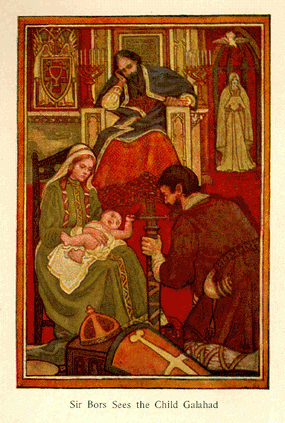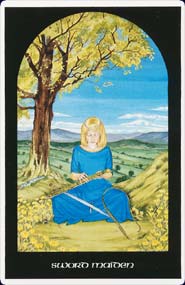[Updated 27 Jan 2019]
[Don’t Go Away Just Yet, Grail] [Grail 1 | Grail 2 | Grail 3 | Grail 4 | Grail 5]
[Related: Arthur myghtern a ve hag a vyth — “Arthur king who was and will be”]
 Bors has given me a sword. I see and feel it pass from his hands to mine. Now among my tasks: how to determine its nature — how and when do I make use of it — and what are appropriate thanks and service for this gift?
Bors has given me a sword. I see and feel it pass from his hands to mine. Now among my tasks: how to determine its nature — how and when do I make use of it — and what are appropriate thanks and service for this gift?
To what degree does this brief inner experience, which I recorded this morning in my journal, arise not from holy sources, but from my personal Grail practice and from such reading as the following, from Knight’s The Secret Tradition in Arthurian Legend?
Galahad, Percivale and Bors accompany the Holy Grail back to Sarras, from whence it came. The maimed king is healed, and the three knights are borne away in the ship with the silver altar above which hovers the glory of the Holy Grail … [I]n due time, Galahad’s wish is granted, and he leaves this life and ascends … Percivale remains in Sarras, and only Bors … returns to tell the tale. In this sense Bors is in the line of succession of great revelatory mystics and prophets, and the keepers and sustainers of the inner mystery traditions (Knight, pgs. 270-271).
If I want to track the experience to its birth, the answer to an either-or question of origins probably matters. But if I want to learn what it can teach me, that question matters much less. (I can explore it at my leisure later, when I’m not storming a castle, or de-rusting my chainmail.)
Mara Freeman asserts in her book Grail Alchemy: “the legends of the Holy Grail open up paths to the spiritual dimensions like no body of lore has done before or since”. I take this as a deeply experiential challenge, not one to be answered by mere intellectual debate, but by results. Once I’ve made a serious sustained effort, I’ll know whether or not these legends — and my practice — open up paths to spiritual dimensions — for me.
(Any desire I have for my way to work for anybody else may be simple generosity, but such an innocent motive can all too quickly sidle up to my insisting it’s the only way — and that should instantly set off all our crap detectors. I keep reciting Postman’s corollary like the holy mantra it is: the main source of bullshit I face is myself. Exhibit A — Bors gives me a sword: an experience to assess and explore for what it can offer. Well and good. But I’m hot stuff because of that experience: deep piles of fresh, steaming bullshit.)
The same holds true with animal guides. (As a wise Druid asked at last fall’s East Coast Gathering, “Why is it everyone’s animal guide is Wolf or Raven or Bear? What about tomato cutworm?”)
I’ve written elsewhere of my experiences with wild boar. Again, the test of any guide, tool or experience is (or can be) utterly practical. As the Galilean master asks, Does it bear “good fruit”? That’s how to “know” in powerful and grounded ways.
Sometimes I can’t quite reach the inward space I need to inhabit for healing. But I can reach for my inner guide, through long familiarity, and touch the bristly fur on his back. Touch was one of my first experiences of my guide — totally unremarkable to me, when I was looking for something more dramatic — and less “mundane”, less physical. For whatever reason, I can readily feel his fur, his pleasure at our connection. Only later, as I note in the post linked in the previous paragraph, did I read in the Druid Animal Oracle the entry for Torc, the Boar: “… he is a representative of the Goddess — his skin can heal you” (Philip and Stephanie Carr-Gomm, The Druid Animal Oracle, Fireside/Simon and Schuster, 1994, p. 39). And I began to appreciate this “earthed” mode of access for what it was, a priceless gift. Once again — you’d think I’d know this by now as one of my ongoing biases — I overlooked the obvious, minimized a non-flashy spiritual connection.
Freeman continues with wise admonitions about “how to tell if you have made it all up or you are being deluded”. After all, you may be wondering where my precious and much-vaunted crap detector is in all of this. Freeman says,
… the imagination is the language of the soul. It is the equivalent of our most important sensory organ — sight — only turned inward rather than outward. Every non-physical thing that exists expresses itself as energy, or Force. The imagination is a creative mechanism that enables us to give Form to Forces of the non-physical planes. (Introduction, Kindle location 349).
I’d generalize Freeman’s words slightly here: Every thing that exists expresses itself. How else do we know it except through its expressions? If I arbitrarily rule out any non-physical expression from my interest or attention — and here we can include emotion, hunch, imagination, intuition, gut feeling, creative impulse, dream, memory, love — I merely impoverish myself. Why on the deep earth or in the starry heavens would I want to do that?!
Several versions of the following story exist:
Once not so long ago there was a great drought in a province of China. The situation grew increasingly dire. The Catholics made processions, the Protestants offered prayers, and the Chinese burned joss-sticks and lit firecrackers to frighten off the drought-demons; but no sign of rain or wisp of cloud appeared in the empty sky. Finally the people said: “We will fetch a rain-maker”. And from another province a dried-up old man appeared. The only thing he asked for was a quiet little house somewhere, and there he locked himself in for three days. On the fourth day clouds gathered and there was a great storm at a time of year when little rain was expected, and the town was filled with rumours about the wonderful rain-maker. Asked what he had been doing during the three days that had caused the rain to fall on the fourth, the old man said: “I come from another country where things are in order. Here they are out of order; they are not as they should be by the ordinance of Heaven. Therefore the whole country is not in Tao, and I also am not in the natural order of things, because I am now here in a disordered country. So I had to wait three days until I was back in Tao, and then, naturally, the rains came”.
This wisdom story is easily reworded to speak in Druid terms. Like most good stories, it leaps cultures without significant diminution.
Another instance: many years ago I bought a used copy of Caitlin and John Matthews’ The Arthurian Tarot. I spent several days familiarizing myself with the images, and skimming the accompanying text (The Hallowquest Handbook, subsequently enlarged) which, beyond the usual short descriptions of each card, details a number of pathworkings and other exercises for the Grail seeker. One of the cards that particularly drew me again and again was the Sword Maiden. Here is the Matthews’ description:
Under a tree sits the Sword Maiden embroidering a scabbard … Dindrane, Perceval’s sister, is part of the Grail quest. She cuts off her hair in order to weave a belt for the sword which Galahad shall carry. She grasps ideas and materializes them; perceptive and discerning, she is vigilant in the cause of truth and justice; she cuts through difficulties by taking the way of self-sacrifice.
 When years later I read that Knight calls Dindrane “the perfect female initiate” (The Secret Tradition, pg. 270) and wrote of Bors that “he represents the initiate … rooted in the world” I realized that I had the makings of a personal practice of polarity working for a Grail quest. Rather than typifying or idealizing any stereotypically gendered element of expression, I see them as energies, inner and outer, available to the Grail seeker in mythic and archetypal forms.
When years later I read that Knight calls Dindrane “the perfect female initiate” (The Secret Tradition, pg. 270) and wrote of Bors that “he represents the initiate … rooted in the world” I realized that I had the makings of a personal practice of polarity working for a Grail quest. Rather than typifying or idealizing any stereotypically gendered element of expression, I see them as energies, inner and outer, available to the Grail seeker in mythic and archetypal forms.
Postman notes in the article I cited in the previous post:
So you see, when it comes right down to it, crap-detection is something one does when he starts to become a certain type of person. Sensitivity to the phony uses of language requires, to some extent, knowledge of how to ask questions, how to validate answers, and certainly, how to assess meanings … What crap-detecting mostly consists of is a set of attitudes toward the function of human communication: which is to say, the function of human relationships.
You might without too much distortion call crap-detection a kind of secular Grail Quest. Or the inverse: the Grail Quest is a holy version of crap detecting — in following it, I’m looking for and working toward a full(er) and healthier relationship with the cosmos and the beings in it, expressed in language and ritual as far as they can take me: naming things as lovingly and accurately as possible, knowing them by their expressions, and also pointing and following beyond words into being (t)here.
/|\ /|\ /|\
IMAGES: Bors; Sword Maiden.
